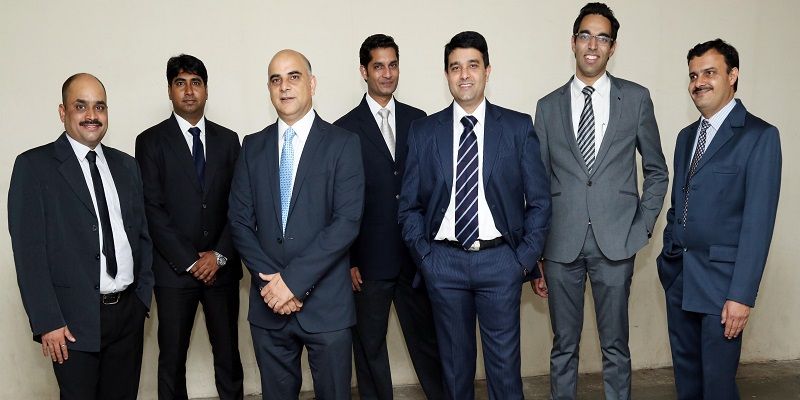HealthAssure offers corporate employees easy access to quality primary care
HealthAssure is not yet another healthtech startup connecting patients with doctors. Yes, it does link patients with doctors and clinics for primary care, but its founders chose to target only corporates.
While startups like Practo and Lybrate help patients choose a doctor and book appointments, HealthAssure partners with corporates on one end and hospitals and insurance companies on the other end.
Tie-ups with corporations like Deutsche Bank work in sync with the health benefit plans of the organisations. The HR department gets a platform that checks on the different health benefits that can be given to the employees and the tests they have undergone or have to.
The insurance partners work as a third party check. Once a user requests for health or life insurance with any of HealthAssure’s partners, like Apollo Munich, Religare, or Cigna, the insurance provider’s agent collects the information and passes it on to HealthAssure.
Taking a different route
The team at HealthAssure then helps the individual with their mandatory checks and tests. HealthAssure has tie-ups with close to 2,000 healthcare institutions and professionals in 800 cities in India.

Citing an example, Varun Gera, 45, Founder and CEO, HealthAssure, says, "If a female patient, an employee of any of the corporates it has partnered with in Jalandhar wants an X-Ray, ECG, and an MRI scan and also wants to meet a dietician on a Sunday, HealthAssure will find the place closest to the patient that is open on a Sunday and has a female technician."
As the doctors and healthcare institutions have tie-ups with HealthAssure, the doctors can log in to get access to patient details. Test results too are uploaded in the database and shared with the insurance companies. Based on this, insurance companies take it further thus reducing the cases of fraud.
A spokesperson for a leading health insurance company that has forayed deep into the healthcare space says, "Working with HealthAssure has been a great experience. Not only do we get access to a premium quality network for our clients but also innovative IT solutions that make great business sense.” The spokesperson spoke on the condition of the company not being named.
The beginnings
Varun’s experience as CEO of healthcare firm United Healthcare India made him realise the gap in the primary services healthcare marketplace.
Varun and his colleagues from United Healthcare India—Ninad Raje, Delly D’Souza and Satish Prabhu—realised that most of the health insurances and benefits focussed on special and specific care. “You might not go to the hospital every day but you definitely go to a primary care centre once every two months. And the market size of the primary care space is $80-90 billion,” says Varun, who co-founded the company in 2011. Blood tests, radiology, diagnostics, MRI, ECG, consultations, dietary checks all fall under primary care.
The team knew from the beginning that they had to take a B2B approach and first worked on building their network and database. “With the tie-ups and benefits we give, we ensure that the database is more than just a directory. Every organisation is assured of the quality of doctors and healthcare institutions on their platform,” adds Varun.
Learning to be an entrepreneur
On the challenges in donning the role of an entrepreneur, Varun says, “What you’re trained as an employee is very different from an entrepreneur. As an entrepreneur, you are doing everything and starting from ground zero, whether it is when you’re talking to the electrician or the plumber or a team member of your client, you are nobody. And that’s a little difficult initially.”
HealthAssure follows a centralised model of operations, so all centres across the country are connected to one central platform and call centre. This, Varun says, was difficult to sell, but today they have built their network and database on this.
Number crunching
The team claims to be doubling in size annually but declined to comment on its revenue. HealthAssure follows a subscription-based model, taking 20 per cent of every case closed. The team claims to close over 15,000 cases every month.
The company received an initial seed amount from serial entrepreneur Rajul Garg, followed by an undisclosed pre-series A. The team now is looking for the next round of investment of $7 million.
YourStory take
While the healthcare market is still in a nascent stage in India, it is expected to reach $280 billion by 2020 (Forbes). No wonder then that last year, close to 7,500 startups across the globe were looking to develop digital solutions in the healthcare space.
While several startups in India are working towards bringing medical practitioners and consumers’ closer using technology, there seems to be a problem at the supply end.
The paid healthcare apps market is believed to be growing at close to 33.8 per cent CAGR.
In the Asian market, Japan and India are believed to be the emerging and most promising countries for healthcare apps. For new healthtech companies, customer adoption is a challenge. By partnering with corporates, HealthAssure is able to solve this problem.
Like HealthAssure, a number of young healthtech companies are coming up in areas as diverse as medical devices and hospital management. India needs all of them.











